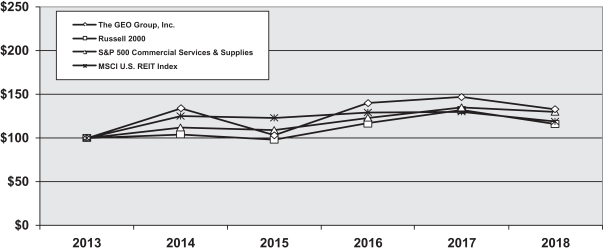State budgetary constraints may have a material adverse impact on us.
State budgets continue their slow to moderate recovery. According to the National Conference of State Legislatures, the outlook for state budgets is stable. Revenue performance is positive, and expenditure overruns are relatively modest. Overall, most state officials anticipate a slow and steady improvement in state finances. As of December 31, 2018, GEO Corrections had 10 state clients and GEO Care had 16 state clients: Florida, Georgia, Arkansas, Louisiana, Colorado, Maryland, Missouri, Virginia, Iowa, Indiana, Kentucky, Illinois, Oklahoma, Nevada, Delaware, New Jersey, North Carolina, South Carolina, Montana, New Mexico, Arizona, Maine, Vermont, Pennsylvania, Texas and California. If state budgetary conditions deteriorate, our 26 state customers’ ability to pay us may be impaired and/or we may be forced to renegotiate our management contracts with those customers on less favorable terms and our financial condition, results of operations or cash flows could be materially adversely impacted. In addition, budgetary constraints in states that are not our current customers could prevent those states from using public-private partnerships for correctional, detention or community based service opportunities that we otherwise could have pursued.
Competition for contracts may adversely affect the profitability of our business.
We compete with government entities and other public-private partnership operators on the basis of cost, bed availability, location of facility, quality and range of services offered, experience in managing facilities, and reputation of management and personnel. Barriers to entering the market for the management of correctional and detention facilities and the provision of community reentry programs may not be sufficient to limit additional competition in our industry. In addition, some of our government customers may assume the management of a facility currently managed by us upon the termination of the corresponding management contract or, if such customers have capacity at the facilities which they operate, they may choose to use less capacity at our facilities. Since we are paid on a per diem basis based on actual occupancy under some of our contracts, a decrease in occupancy could cause a decrease in both our revenues and our profitability.
We are dependent on government appropriations, which may not be made on a timely basis or at all and may be adversely impacted by budgetary constraints at the federal, state, local and foreign government levels.
Our cash flow is subject to the receipt of sufficient funding of and timely payment by contracting governmental entities. If the contracting governmental agency does not receive sufficient appropriations to cover its contractual obligations, it may terminate our contract or delay or reduce payment to us. Any delays in payment, or the termination of a contract, could have a material adverse effect on our cash flow and financial condition, which may make it difficult to satisfy our payment obligations on our indebtedness, including the 6.00% Senior Notes, the 5.125% Senior Notes, the 5.875% Senior Notes due 2022, the 5.875% Senior Notes due 2024 and the senior credit facility, in a timely manner. In addition, as a result of, among other things, recent economic developments, domestically, federal, state and local governments have encountered, and may continue to encounter, unusual budgetary constraints. As a result, a number of state and local governments may be under pressure to control additional spending or reduce current levels of spending which could limit or eliminate appropriations for the facilities that we operate. Additionally, as a result of these factors, we may be requested in the future to reduce our existing per diem contract rates or forego prospective increases to those rates. Budgetary limitations may also make it more difficult for us to renew our existing contracts on favorable terms or at all. Further, a number of states and foreign governments in which we operate may experience budget constraints for fiscal year 2019. We cannot assure you that these constraints would not result in reductions in per diems, delays in payment for services rendered or unilateral termination of contracts.
Public resistance to the use of public-private partnerships for correctional, detention and community based facilities could result in our inability to obtain new contracts or the loss of existing contracts, which could have a material adverse effect on our business, financial condition and results of operations.
The management and operation of correctional, detention and community based facilities under public-private partnerships has not achieved complete acceptance by either government agencies or the public. Some
39
